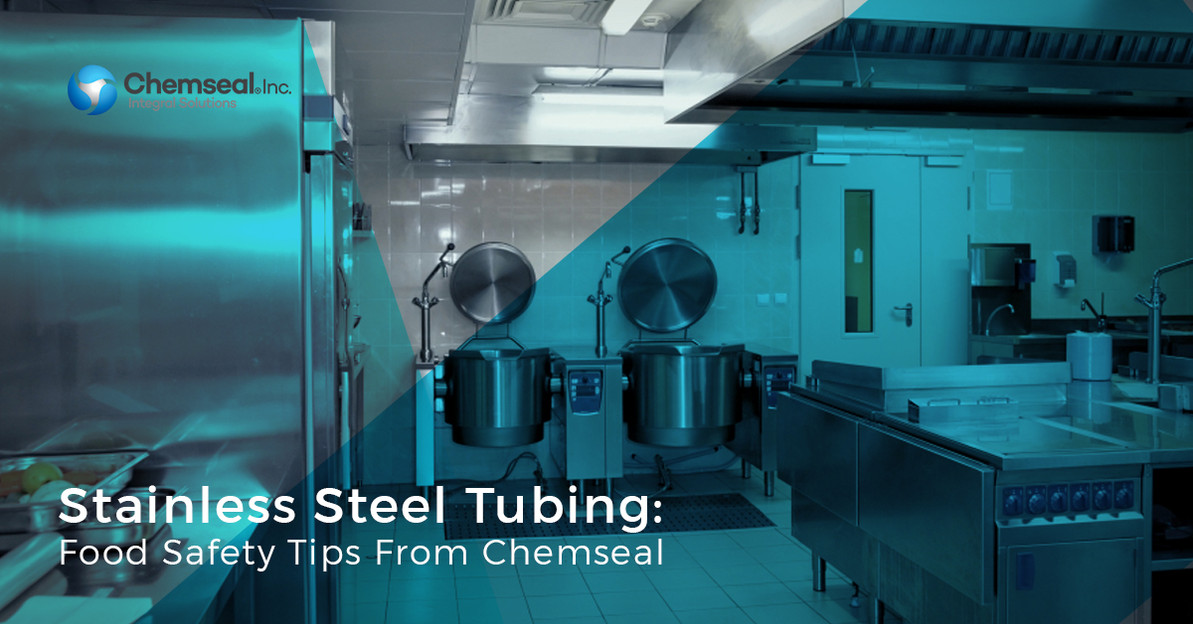 Jun 16th 2017
Jun 16th 2017 Stainless Steel Tubing: Food Safety Tips From Chemseal
 At Chemseal, we think that sanitation is very important. In fact, sanitation is the core purpose of our business - by using sanitary stainless steel tubing and other sanitary stainless steel fittings, we help to ensure the absolute highest levels of sanitation for industries like biotech, dairy, food and beverage, and pharmaceutical industries. All of these vital industries rely on consistent and reliable sanitary fluid processes made possible through our easy-to-clean, sanitary stainless steel materials.
At Chemseal, we think that sanitation is very important. In fact, sanitation is the core purpose of our business - by using sanitary stainless steel tubing and other sanitary stainless steel fittings, we help to ensure the absolute highest levels of sanitation for industries like biotech, dairy, food and beverage, and pharmaceutical industries. All of these vital industries rely on consistent and reliable sanitary fluid processes made possible through our easy-to-clean, sanitary stainless steel materials.
Like our stainless steel, food production and preparation also places an importance on sanitation. Because we’re so passionate about sanitary processes here at Chemseal, today’s post is dedicated to various food safety tips. The last thing that anyone wants to do is get sick, and our sanitary stainless steel tubing and fittings do a great job at preventing the spread of harmful germs and bacteria, therefore preventing countless people from getting sick! Let’s take a look at some useful food safety tips that anyone can use at home, at work, and so forth.
The Basics
Effective food safety includes proper handling, cooking, and storage of food. These aspects of food safety should be followed very closely in order to prevent the spread of foodborne illness, especially because humans cannot see, smell, or taste harmful bacteria that is known to cause foodborne illness. In every step of food preparation, keep the following four main steps in mind from the Food Safe Families campaign, as referenced by the USDA:
- Clean: Frequently wash your hands and surfaces that you’ll come in contact with, and wash them thoroughly with warm water and soap.
- Separate: Don’t cross-contaminate different foods, i.e. raw meats crossed with vegetables.
- Cook: Cook food to the right temperature, especially meats. If you don’t know the right temperature, look it up.
- Chill: Refrigerate your leftover or excess food promptly after you’ve eaten and minimize any time the food spend in room temperature conditions.
Shopping Tips
Food safety can start right at the grocery store before you’ve even made it home with your tasty purchases. For one, when you’re at the grocery store, select your non-perishables first before adding any refrigerated or frozen items to your cart. Ideally, you’ll want to limit the time that your refrigerated and frozen items spend outside their chilled environments - if you’re out-and-about, bring an insulated cooler to keep your items colder before you get home. If not, bring your items straight home.
When you’re selecting any sort of meat or poultry, never choose something in packaging that is torn, leaking, or unsealed for any reason. If outside air gets to the raw meat, then it can get spoiled, become contaminated, and make you sick after you eventually cook and eat it. Always carefully inspect the packaging before you put it in your cart.
Also, pay attention to ‘sell-by’ or ‘use-by’ dates, or any other kind of expiration date. Dry packaged products, such as crackers, are generally fine to eat after their ‘best by’ date because they don’t become contaminated, just stale. But with perishable items like meat, seafood, poultry, fruits and vegetables, it’s always best to play it on the safe side. It’s simply not worth it to get sick from buying something with even a slightly questionable expiration date.
Keep That Cutting Board Clean!
This is one of the more commonly known food safety tips, but it’s still extremely important to know and practice regulatory food sanitation when you cook anything. Wash cutting boards and knives with hot, soapy water after food preparation, especially after cutting and dealing with raw meat, poultry, or seafood. After you wash your cutting board(s), sanitizing your counters and other relevant areas with a diluted bleach solution or alternative natural cleaner is also a smart move.
Watch Those Towels
A lot people tend to let their kitchen towels and rags go too long without being washed, which invites germ build up and other nasty things that you don’t want around your food. Always remember to replace and wash dish towels (and sponges!) often to prevent the spread of harmful bacteria throughout your kitchen. After handling raw foods, use paper towels to dry your washed hands. Paper towels are also good for cleaning surfaces, as the remaining germs and contaminants will disposed of instead of remaining on a reusable towel.
Stay Tuned For More Sanitation Tips From Chemseal!
Chemseal is committed to providing the best integral solutions and sanitary stainless steel tubing on the market, and we encourage you to share our hygienic passions. For more information about sanitary tubing and other sanitary stainless steel services we offer, visit here or get in touch with us now.
 Jun 16th 2017
Jun 16th 2017 Recent Posts
-
Nov 7th 2022
What Is Food-Grade Stainless Steel Tubing?
Businesses that produce food and beverage products must operate hygienically. Sterile environments a …Nov 7th 2022
-
Oct 11th 2022
Why Sanitary Fittings Are Important for the Medical Industry
Sanitary fittings are useful for many industries. Food and beverage manufacturers have used these to …Oct 11th 2022
-
Sep 23rd 2022
What Is the Max Operating Temperature for Stainless Steel?
Stainless steel is valued in many industrial applications because it’s capable of withstanding high …Sep 23rd 2022





